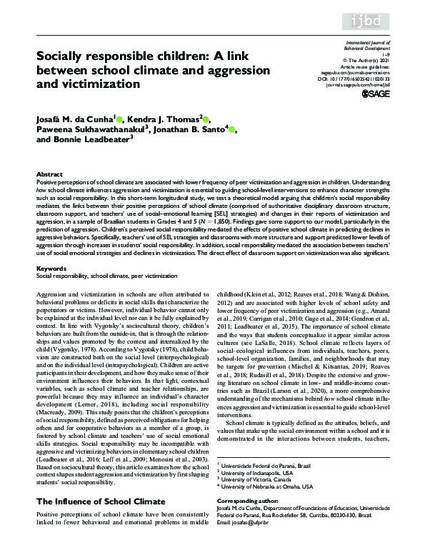
Article
Socially responsible children: A link between school climate and aggression and victimization
International Journal of Behavioral Development
(2021)
Abstract
Positive perceptions of school climate are associated with lower frequency of peer victimization and aggression in children. Understanding how school climate influences aggression and victimization is essential to guiding school-level interventions to enhance character strengths such as social responsibility. In this short-term longitudinal study, we test a theoretical model arguing that children’s social responsibility mediates the links between their positive perceptions of school climate (comprised of authoritative disciplinary classroom structure, classroom support, and teachers’ use of social–emotional learning [SEL] strategies) and changes in their reports of victimization and aggression, in a sample of Brazilian students in Grades 4 and 5 (N 1⁄4 1,850). Findings gave some support to our model, particularly in the prediction of aggression. Children’s perceived social responsibility mediated the effects of positive school climate in predicting declines in aggressive behaviors. Specifically, teachers’ use of SEL strategies and classrooms with more structure and support predicted lower levels of aggression through increases in students’ social responsibility. In addition, social responsibility mediated the association between teachers’ use of social emotional strategies and declines in victimization. The direct effect of classroom support on victimization was also significant.
Disciplines
Publication Date
2021
Citation Information
Jonathan Bruce Santo. "Socially responsible children: A link between school climate and aggression and victimization" International Journal of Behavioral Development (2021) Available at: http://works.bepress.com/jonathan_santo/63/
